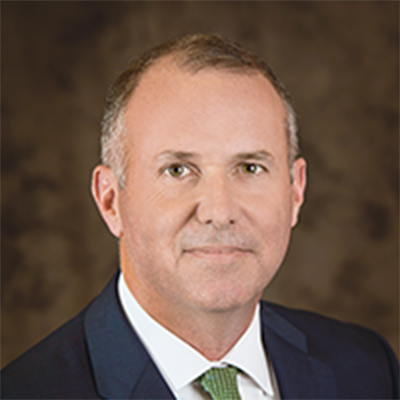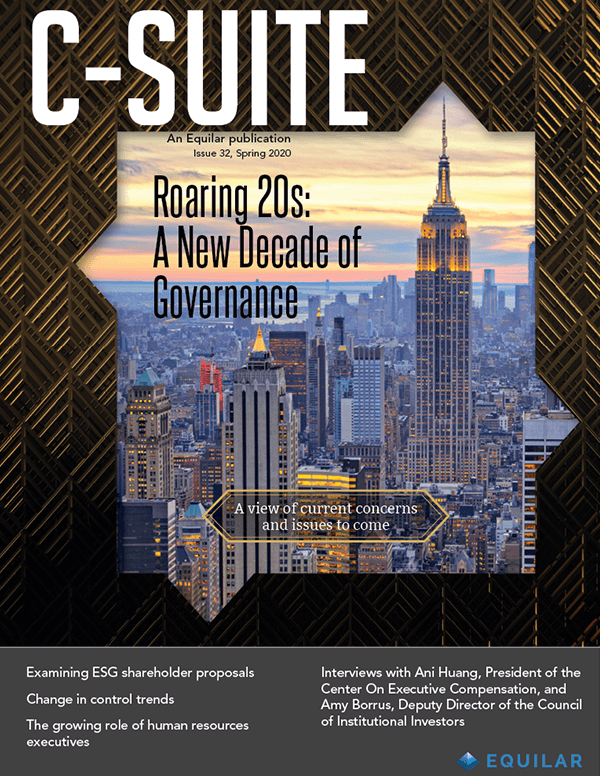Equilar Institute

2020 Vision: What Governance Topic Will Define the Decade Ahead?
What governance topic will define the decade ahead?

Jim Wolf
Managing Partner
Meridian Compensation Partners, LLC
Jim Wolf has served corporate boards and senior management teams for over 25 years in the areas of executive compensation, governance, performance- based pay and benefits.
Meridian is the leading compensation advisor in the oil and gas industry. Mr. Wolf leads a team of Texas based consultants serving companies in the upstream, services, midstream and downstream segments of oil and gas. Mr. Wolf’s clients cross a variety of industries, including the engineering and construction, transportation and consumer services sectors. Mr. Wolf works with public and private organizations ranging from Fortune 100 companies to recent startups.
Mr. Wolf speaks frequently on compensation practices and governance strategies, including energy industry compensation and the alignment of compensation with performance in commodity-based businesses. Mr. Wolf serves on the advisory board of the Texas Tri-Cities chapter of the National Association of Corporate Directors, and on the board of the Montgomery County Food Bank.
Mr. Wolf earned an MBA from The Wharton School of Business at the University of Pennsylvania, and a BS in Economics and German from Williams College.
As we enter the 2020s, several governance themes seem likely to continue their influence over the next decade: “stakeholder” governance, the broad ESG agenda, new frontiers for reputational risks and other broad areas of corporate risk management, to name a few.
The single influence that seems most certain, and with the greatest possible impact, is the continued rising influence of institutional investors—as individual entities and as a powerful collective. The top five institutions currently manage about $20 trillion of investments. Powerful investors enter the 2020s with a potent combination of available public data, growing proxy rights and financial might to exercise their influence.
The past 25 years have featured the “bright light of disclosure” as the go-to remedy when regulators seek solutions to perceived corporate governance problems. New regulations have required companies to flood the market with a wide array of financial, strategic, governance and compensation information.
Concurrently, investors have earned greater influence over the proxy ballot. Say on Pay, proxy access and contested elections have provided investors—both institutional and activist—a broader platform to have a voice, and to influence change.
Oddly, the majority of institutional investors seemed caught off guard when Say on Pay rolled out in 2013. Few had prepared a methodology to exercise their vote, and even fewer had prepared for the onslaught of “campaign” calls from the roughly 15% of their portfolio companies where ISS recommended AGAINST Say on Pay. Since then, investors have taken greater advantage of the available information on their portfolio companies and greater control of the powerful voice offered through the proxy.
The “Information Age” now gives investors access to several decades of publicly available financial, strategic, share price, executive pay and governance data. Investors with enough resources can now search, sort and analyze this data across years, companies and industries. Investors so inclined have the opportunity to develop and declare tighter governance standards, use data to prove their case, identify “outliers” more quickly and initiate change at targeted companies.
Companies and boards will be forced to prepare and explain their actions against a growing list of investor governance standards.
Over the next decade, the advancing “science” of tracking different institutional investor standards across a company’s shifting shareholder base will also play a bigger role in strategic decisions. The biggest impact will occur if the largest institutions band together to enact governance change. Regulators won’t need to lead the charge. A short list of the four to five largest institutions could together have a big influence over fundamental governance practices in the 2020s.

Rich Fields
Director,
Corporate Shareholder Engagement
King & Spalding
The relationships between corporations and their stakeholders are undergoing significant changes, as roles and objectives shift rapidly. Public companies must comply with regulations imposed by the SEC and the stock exchanges, but this compliance is often only the beginning of a company’s obligations. Corporate officers, directors, shareholders and their respective advisors are presented with more important challenges—and opportunities—in employing good governance to build the value of the enterprise. Rich Fields helps lead King & Spalding’s work in this area, advising public company boards of directors, C-suite executives and in-house counsel on issues related to corporate governance, board leadership and stakeholder engagement.
Mr. Fields’ expertise includes board composition and leadership, effective disclosure, activist and other shareholder interventions, shareholder and other stakeholder engagement, board and director evaluations, ESG issues, governance policies, and other complex issues involving boards and corporate leaders.
The effects of the dramatic growth of passive investing strategies and the “Big Three” investors will be the governance story of the next decade. Corporate executives, boards and investor relations teams prepare for a new world in which the Big Three become more powerful and engaged while active investment managers become even more active to stand out.
Research last year from Lucian Bebchuk and Scott Hirst found that the Big Three investors—BlackRock, Vanguard and State Street Global Advisors—hold roughly 17% of Russell 3000 companies and 21% of S&P 500 companies. Since these passive investors vote virtually all of their shares and other investors do not, the Big Three represent about 21% and 25% of all director votes at Russell 3000 and S&P 500 companies, respectively. That voting power is forecast to grow dramatically in coming years, up to 30% (Russell 3000) and 35% (S&P 500) by the end of the decade.
These firms are taking market share held by more traditional money managers—firms that have been hard-pressed to justify their premium fees. In the past five years, 76% of actively managed firms failed to beat their benchmarks.
Amid these major shifts has been a dramatic rise in the attention investors of all stripes place on environmental, social and governance factors. Some spend their days arguing about the reason for the growth in ESG, but that, frankly, misses the point. For whatever reason or reasons, ESG is here to stay. Firms that have not previously invested in oversight of ESG issues are creating small teams; those who had small teams are growing them. Many of these groups are now called “investment stewardship” teams, a meaningful shift in how they think of themselves and the importance with which their firms view the function. This, in turn, puts pressure on traditional investment professionals (whether or not augmented by ESG specialists) to stand out and demonstrate superior performance that justifies higher fees.
Over the last few years, public companies have begun dealing with this new normal, where the largest investors are concerned about issues where IR teams are least conversant and active investors adopt activist tactics to stand out from the crowd. Those trends will continue in the next decade, forcing companies to leverage different expertise to succeed with their shareholders and other important stakeholders.

Anthony Goodman
Managing Director
Russell Reynolds Associates
Anthony Goodman is a senior member of Russell Reynolds Associates Board & CEO Advisory Partners. Based in Boston, he works with board directors and their stakeholders across sectors and countries. Mr. Goodman advises boards of major public, private and family-owned businesses on a wide variety of confidential matters. Mr. Goodman is also Co-Chair of The Conference Board ESG Center’s Human Capital Oversight & Disclosure Working Group.
Prior to joining the firm, Mr. Goodman spent more than 12 years at Tapestry Networks convening board directors, investors and regulators for peer learning and mutual understanding. Mr. Goodman created and led many board director networks, including those for Fortune 500 lead directors and audit committee chairs. He was also Founder and Co-Chair of the Shareholder-Director Exchange (SDX), which developed the first protocol for board-shareholder engagement in the U.S. Mr. Goodman received his MA in politics, philosophy and economics from Oxford University, where he was elected president of the Oxford Union.
Since no single person is a reliable sage and all too many expert predictions end up in the trash can of history, I think it is more reliable to crowdsource the answer to the question.
Each year Russell Reynolds Associates interviews more than 40 global corporate governance professionals drawn from leading institutional investors, pension funds, proxy advisors and activist investors about what will be the major trends impacting corporate governance in the year ahead.
We have been running our global study for the last four years, and this year was the first in which environmental, social and governance (ESG) issues—and, in particular, the first two components—were the main global trend. The focus on ESG is going to be a major topic for both boards and management for the foreseeable future.
The U.S. has often lagged behind Europe on these issues but the Business Roundtable’s “Statement on the Purpose of a Corporation” last year, together with increasing investor pressure for long-term sustainable growth and campaigns to improve board oversight of climate risks and human capital management, have put ESG at the top of the agenda of every major player in the corporate governance ecosystem.
In the 2020s, boards will be expected to strengthen their oversight and knowledge of material ESG matters and disclose their connection to the business in the form of both risks and opportunities. This will require triple bottom line (people, planet and profit) thinking to be deployed throughout the management and board oversight processes. The Task Force on Climate-related Financial Disclosures (TCFD) and the Sustain- ability Accounting Standards Board (SASB) will become boardroom acronyms understood by all directors. Ensuring sustainable leadership at the top of the company will be a key priority.
ESG is the white knight who has arrived to rescue capitalism from its enemies. Instead of a lance, this white knight carries a license to operate. The new focus on purpose in addition to profit, stakeholder rather than shareholder primacy, and the need to wow Millennial and Gen Z consumers and employees with an outstanding record on environmental and social issues, will help capitalism adapt and survive in a world where the support for socialism among the same demo- graphics is rising. ESG is not a threat to profitable growth but its savior. Embracing ESG will enable capitalism to renew itself for a new decade and another generation.
 Solutions
Solutions











